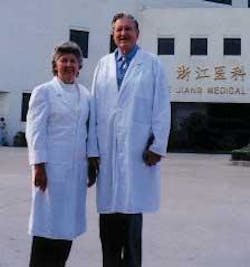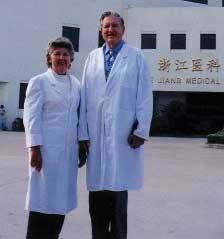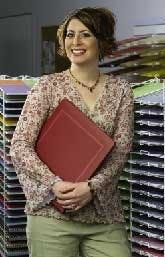Readers' Forum
The balance provided by horses
Dear RDH:
I enjoyed the article, "Horses and Hygienists" (February 2003 issue) very much. I have been in love with horses ever since I first saw one. At age four, I was literally kicked right out of my shoes by a horse!
Today, I work three days a week at a general practice in Delray Beach, Fla., and also part-time at Pompano Park Harness Track in Pompano Beach. In 1999, I started out in the Winner's Circle leading the winning horse and driver in for their photos with the trainer and owners. My smile actually got me the job! "We want that winning smile on our video cameras when we simulcast to other tracks!" I thought I had died and gone to heaven.
At that time, my beloved Australian Shepherd was allowed in the "backstretch" of the track. The horses loved her and she loved to chase the barn cats. I eventually learned to "paddock" horses on race nights, jogged them and did pre-race warm-ups; I even got to lead some post parades on horseback, and in general, just had one heck of a good time.
I agree with Patricia Anderson that horses definitely balance my life, and I'm sure the other hygienists in the article feel the same way. I can relax from the pressures of the office grind by getting dirty, moving at a slower pace, having a variety of duties, being outside in the sunshine and fresh air, starting at dawn and finishing by lunch, or working until midnight and eating pizza with the guys after the races.
My life is so full, and I've never been happier nor felt more complete. I, too, have photos in my operatory and they are certainly ice-breakers. I've become quite the track "tour-guide" for many of my patients. I'm able to show them the other side of racing; the horses love the carrots and apples patients bring, and everybody has a great time. Life is good ... very good.
Mary Scott, RDH
Delray Beach, Florida
Manufacturers welcome feedback
Dear RDH:
I want to comment about the opening remarks (Editor's Note) in March 2003 RDH. After reading your article I felt compelled to respond. I want to thank you for this article. I am a hygienist who practiced for seven years before beginning my career with a dental manufacturer a little over a year ago.
This article could not be more true. As a hygienist, I always felt a bit reluctant about approaching a booth when attending a dental convention. I am not just after something free, and, after all, I have no authority to make a purchase. But I do have authority to choose the products that I use or recommend once I get back to my office. I always thought, "tell me about your products, I am not wasting your time," always thirsty for learning about the latest and greatest. The assumption is that they always just want to sell.
Now, working on the other side of the booth, I know that manufacturers are thirsty for feedback. We love to hear what dental professionals think about products, and how they use them and incorporate them into patient care. Ask to try their products for yourself to see if you like them. That is the purpose of sampling. We want you to try them, use them, and see what you like or dislike about them. We want you to know all about the products. How else can we constantly try to meet and even exceed expectations? Please do come talk to us. The more you know about what each manufacturer has to offer with each type of product, the more informed a decision can be about which product you want to use, or in some cases recommend for use. The more a manufacturer knows about your likes and dislikes, the better they can make their products. This is evidence-based decision making at its best. A dental convention is the ideal opportunity to learn and teach. It's mutually beneficial.
Beth Jordan RDH, BS
North Berwick, Maine
Different degrees are not a contest
Dear RDH,
I find the letters people write concerning which hygiene degree is better perplexing. Why are we comparing ourselves and our degrees as if practicing hygiene is some kind of contest? The problem is that there is no standard degree requirement to practice hygiene. Our professional requirements vary from state to state and in the military. A license is not required to be held by enlisted military hygienists in the Navy. However, they do complete an accredited associate hygiene program. In Alabama, preceptorship is considered acceptable training to practice hygiene. In the other 49 states, a degree from an accredited school and a license is required to practice.
Junior colleges, community colleges, technical schools, and universities throughout the country all offer hygiene degrees. It is clear there is no absolute requirement for practicing hygiene. If we compare ourselves to doctors and nurses, it is obvious we are a bit confused about our professional requirements. Because hygiene practice has no standardized degree requirement, we struggle with ridiculous comparisons about who is better within our occupation. All accredited hygiene programs must meet certain requirements whether they are bachelor's or associate's. The problem is that an associate's degree is thought of as a technical degree and can be completed in two years, while a bachelor's is considered a professional degree requiring four years for completion.
However, this is not true of the hygiene degree. An associate degree in hygiene is usually two and a half years with a year of prerequisites. That's three and a half years for this degree. In six more months, the student could have obtained a bachelor's degree. The quality of the education is not the issue; the prestige of the degree is. A bachelor's degree denotes a more complete, well-rounded education (not specific to hygiene) when compared with an associate's.
We need to decide on one degree that everyone is required to have, whether it is an associate's or a bachelor's. Associate-degreed hygienists are obviously equal professionals and have committed the time and effort towards becoming a hygienist. Is it fair that they have been to school for three years or more and receive an AS? Do MDs have different degree requirements to receive their doctoral degrees and license? No. Why are we so varied in our education? Our profession needs to make a decision and execute changes so that we are all equal. A decision must be made about our education requirements. We must resolve what type of degree our profession requires, is it really that difficult?
Karina Skatvold, RDH
Keflavik, Iceland
Express pride in our differences
Dear RDH:
I am compelled to add to the numerous letters received concerning the Alabama preceptorship program, two-year vs. four-year degrees, hourly vs. commission wages, and segregation. I am always intrigued by how, as humans, we try desperately to narrow our beingness to smaller and smaller groups and continue to segregate ourselves from the whole. It is apparent in religion, in life, and, yes, dental hygiene.
I have seen many, many changes since graduation in 1972 from the charter class of Miami-Dade Junior College. A prophy meant, "Jump in and go full speed, and get the job done." The span of 17 years included two regional and three state boards and more than 20 offices. In 32 years, I have seen the gamut of dentistry and dental hygiene range from unnecessary greed and complacency, to stellar workmanship and integrity.
However, in all of the offices, I added skills (not having aquired them all in school), along with many hours of continuing education. I would venture to guess that the hygienists I have worked with across Florida, New Hampshire, Georgia, Arizona, and Idaho are equally split between two- and four-year programs. I definitely could not guess which came from which. All of the hygienists came from accredited hygiene schools.
Therefore, I shouldn't have seen unreadable diagnostic films — repeatedly — the same persistent areas of sub calc from bitewing to bitewing, perio neglect, etc., but I did. However, take heart that this letter is not about blame but learning, being, and having personal accountability. It's a plea to become involved in your professional association and self-regulation.
I have had an incredible ride for 32 years in a profession I am proud to represent. Having been blessed with a major illness for the last 25 years, I have had to examine the very core of my being — to find great joy in our sameness, as well as in our differences. The quest to learn and do with great humility and passion is ongoing and never-ending.
Give me a great MD, DO, DDS, or RDH with a thirst for learning and a desire to help through thoroughness and integrity! I believe these people are among us all. I am sure they are in Alabama, too. Most of who we are is who we want to be!
Let's embrace dental hygiene by expressing our pride and expectations inclusively — we will all grow. Let's honor our growth in a positive way and support one another under an umbrella of all dental hygienists. I think we can promote change when encouragement, awareness, and hard work are the stepping stones we learn to walk on. The best is now and the best is yet to be.
Barbara Smith Sims, RDH
Boise, Idaho
First one to China?
Dear RDH:
My wife receives RDH, and we read with interest an article in the February 2003 issue. The article, "A delegation to China," by Judith Sulik, RDH, was very interesting. The article states that 18 dental hygienists made history in China as members of a People-to-People Ambassador program. They may have been the first People-to-People delegation of dental hygienists in China — and I don't want to burst their bubble — but, as far as we know, my wife, Doris L. Sloan, RDH, was the first dental hygienist in all of China.
She graduated from the University of Southern California in 1955 and was president of her class. She practiced dental hygiene for 40 years in California. Her state license number is 802.
My name is Jack H. Sloan, ChE, DDS. I graduated from the University of Calforinia, Berkeley, in 1950, and was a design chemical engineer in petroleum refinery and petro-chemical plant design for nine years. I then went to dental school and graduated from Loma Linda University in 1963. I practiced dentistry in Paso Robles, Calif., for 35 years. We are retired now.
For 36 years, we intermittently donated dental services on foreign soil. We made many trips to remote areas of Mexico and traveled with such groups as the "Flying Doctors," LIGA, and the student/faculty groups from Loma Linda University. The longest trip was one of six weeks to Chamula Indian country in the southern most state of Chiapas near the Guatemala border.
We also worked with the Chechua Indians 40 miles up the Esmeraldes River by dugout canoe in Ecuador. Doris performed oral prophylaxis on the chief there — the first time he had ever had his teeth cleaned.
In 1997, we were invited by the People's Republic of China and Loma Linda University to head up a new dental clinic in the Sir Run Run Shaw Hospital in Hangzhou, China. Shao Ye Fu, a very wealthy Chinese businessman in Hong Kong, had grown up in Zhejiang Province where the hospital is located. Some years prior, his mother was visiting in California when she became very ill and eventually ended up being admitted to the Loma Linda University Medical Center. Her life was saved and Shao Ye Fu was very grateful. He wanted to give something back to his native province and, in conjunction with Loma Linda University, designed and built a 400-bed hospital and dental clinic in the city of Hangzhou. He also contracted with Loma Linda University to help staff the hospital with American doctors to train the Chinese staff in western dentistry and medicine.
Doris and I were in charge of the dental clinic in Sir Run Run Shaw Hospital. They told us that Doris was the first dental hygienist in China as they have no dental hygiene program there. She gave lectures and demonstrations, and worked with patients while the staff was observing. Her first patient was a Chinese dentist who had been a dentist for 11 years and had never had his teeth cleaned. The Chinese dentists all presented with decay, missing teeth, and perio problems. We had seven Chinese dentists in the clinic, one X-ray technician, three lab technicians, one sterilizing technician, and three chairside assistants.
I gave lectures, demonstrations, and worked with the patients. We were doing some nice Ceramco crown-and-bridge work, metal partials, full dentures, and many restorations. Patients ranged everywhere from poor Chinese laborers to business people, venture partner personnel, and high-ranking Communist military officers. We were there for 2 1/2 months in 1997 and have been invited back every year since. But we are retired now and do not participate in any more mission trips.
In addition to her dental hygiene work and dental exams in the local schools, Doris had a life-size mannequin with glass lungs, which smoked real cigarettes — collecting the tars and nicotine in the glass lungs. She gave her stop-smoking lectures and demonstrations to every public and parochial school, as well as the country health administration in our area. She also had "Smoking Sam" in the county fair and that was one of the most visited booths at the fair. Students who had seen Sam at school brought their parents over for the demonstration.
Doris is also past president of the Paso Robles Junior Women's Club and her "Smoking Sam" health project was awarded first place in the health division for the state in the Junior Women's Club projects.
The Chinese administration was so impressed with the dental hygiene work that, when we left, they suggested they should start a school of dental hygiene in the Zhejiang Medical University there in Hangzhou. We have been fortunate to have three of the Chinese dentists come to California for post-graduate work at Loma Linda University since we returned, and so have been able to continue our relationship with the clinic through letters and in person.
It was our privilege over the years to donate dental services to many primitive people who otherwise had no opportunity for such professional services.
Jack H. Sloan, ChE, DDS
Doris L. Sloan, RDH, BS
Pittsfield, Massachusetts
Editor's Note: A good life of service — we tip our hat to you.
Correction
In an article titled, "Maintenance of the esthetic integrity of dental restorations," figure 1 on page 74 of the March 2003 issue should have been attributed to: Gladwin M, Bagby M: Clinical Aspects of Dental Materials, Lippincott, Williams and Wilkins, Philadelphia, p67, 2000.
About the coverWith one-year-old daughter Macy already a part of the household and a second child due in October, Carla Rhodes of Lincoln, Ill., has understandably gotten swept along in the "scrapping" craze. She estimates that she spends three hours a week and attends numerous weekend workshops to piece together the stories and pictures of her family's life.
A 1998 graduate of Lake Land College in Mattoon, Ill., Rhodes finds her experiences as a new mother spilling over into the general practice where she is employed. After the birth of Macy, she was "surprised to find that after four years in this profession, I am still learning about myself. Now, when children sit in my chair, I picture my daughter there, vulnerable, and my thoughts change from when my next is due to, 'Wow! This child deserves a great experience and my full attention.' "
Lincoln is a small town about 35 miles south of Springfield. Farming and small-town values are an integral part of the community.
"I often see these children at the store, at restaurants, and riding their bikes in the neighborhood. When they wave and say, 'Hello,' it warms my heart. These children are not just names on the schedule anymore. They know they receive the same care I would give my own daughter. Let's not forget what it was like to be a child!"
To submit letters to the editor for publication in Readers' Forum, send by:• Mail — P.O. Box 3408, Tulsa, OK 74101
• E-mail — [email protected]
• Fax — (918) 831-9804
Besides a "signature," letters also must indicate the city and state where the writer resides or practices.


